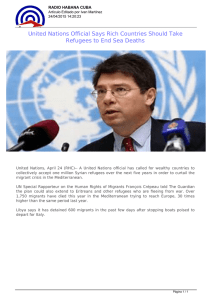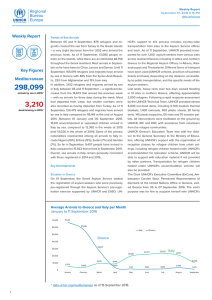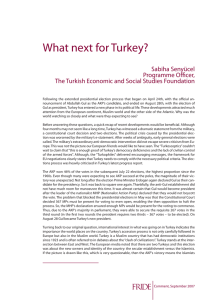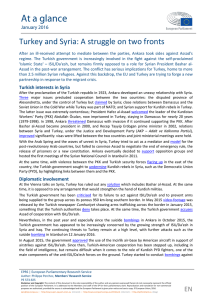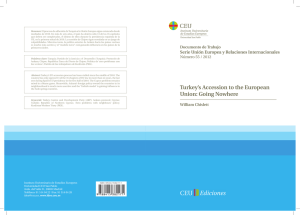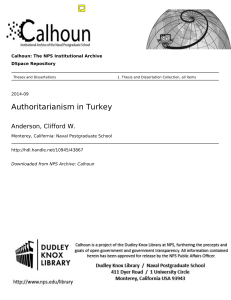Implementing the EU-Turkey Agreement – Questions and
Anuncio
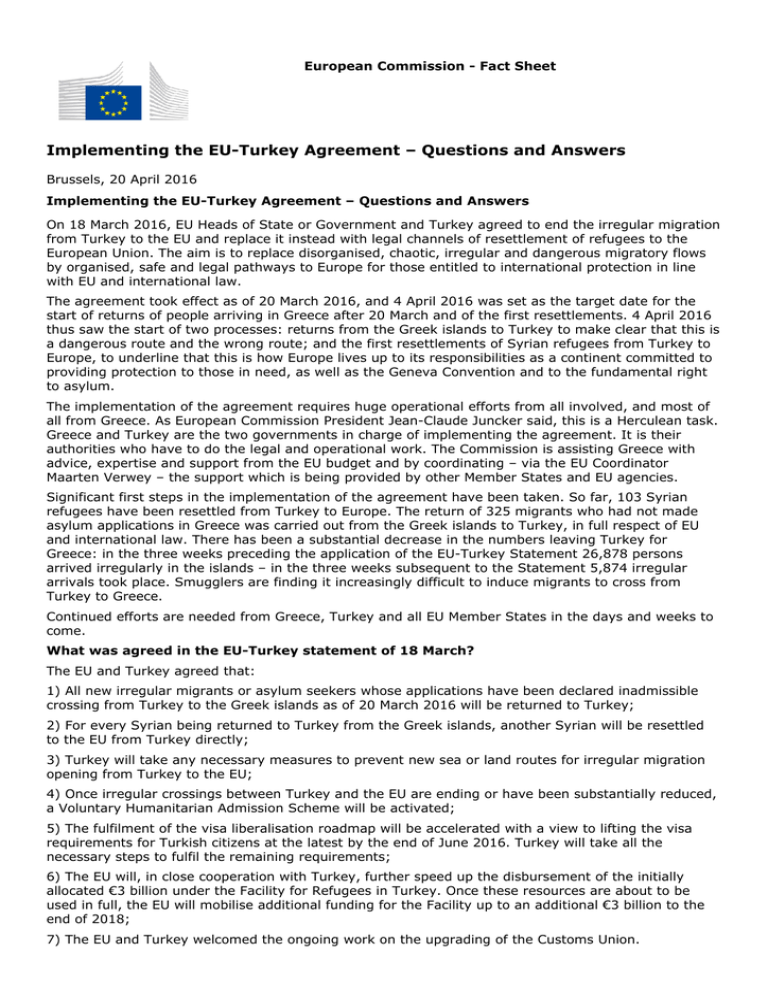
European Commission - Fact Sheet Implementing the EU-Turkey Agreement – Questions and Answers Brussels, 20 April 2016 Implementing the EU-Turkey Agreement – Questions and Answers On 18 March 2016, EU Heads of State or Government and Turkey agreed to end the irregular migration from Turkey to the EU and replace it instead with legal channels of resettlement of refugees to the European Union. The aim is to replace disorganised, chaotic, irregular and dangerous migratory flows by organised, safe and legal pathways to Europe for those entitled to international protection in line with EU and international law. The agreement took effect as of 20 March 2016, and 4 April 2016 was set as the target date for the start of returns of people arriving in Greece after 20 March and of the first resettlements. 4 April 2016 thus saw the start of two processes: returns from the Greek islands to Turkey to make clear that this is a dangerous route and the wrong route; and the first resettlements of Syrian refugees from Turkey to Europe, to underline that this is how Europe lives up to its responsibilities as a continent committed to providing protection to those in need, as well as the Geneva Convention and to the fundamental right to asylum. The implementation of the agreement requires huge operational efforts from all involved, and most of all from Greece. As European Commission President Jean-Claude Juncker said, this is a Herculean task. Greece and Turkey are the two governments in charge of implementing the agreement. It is their authorities who have to do the legal and operational work. The Commission is assisting Greece with advice, expertise and support from the EU budget and by coordinating – via the EU Coordinator Maarten Verwey – the support which is being provided by other Member States and EU agencies. Significant first steps in the implementation of the agreement have been taken. So far, 103 Syrian refugees have been resettled from Turkey to Europe. The return of 325 migrants who had not made asylum applications in Greece was carried out from the Greek islands to Turkey, in full respect of EU and international law. There has been a substantial decrease in the numbers leaving Turkey for Greece: in the three weeks preceding the application of the EU-Turkey Statement 26,878 persons arrived irregularly in the islands – in the three weeks subsequent to the Statement 5,874 irregular arrivals took place. Smugglers are finding it increasingly difficult to induce migrants to cross from Turkey to Greece. Continued efforts are needed from Greece, Turkey and all EU Member States in the days and weeks to come. What was agreed in the EU-Turkey statement of 18 March? The EU and Turkey agreed that: 1) All new irregular migrants or asylum seekers whose applications have been declared inadmissible crossing from Turkey to the Greek islands as of 20 March 2016 will be returned to Turkey; 2) For every Syrian being returned to Turkey from the Greek islands, another Syrian will be resettled to the EU from Turkey directly; 3) Turkey will take any necessary measures to prevent new sea or land routes for irregular migration opening from Turkey to the EU; 4) Once irregular crossings between Turkey and the EU are ending or have been substantially reduced, a Voluntary Humanitarian Admission Scheme will be activated; 5) The fulfilment of the visa liberalisation roadmap will be accelerated with a view to lifting the visa requirements for Turkish citizens at the latest by the end of June 2016. Turkey will take all the necessary steps to fulfil the remaining requirements; 6) The EU will, in close cooperation with Turkey, further speed up the disbursement of the initially allocated €3 billion under the Facility for Refugees in Turkey. Once these resources are about to be used in full, the EU will mobilise additional funding for the Facility up to an additional €3 billion to the end of 2018; 7) The EU and Turkey welcomed the ongoing work on the upgrading of the Customs Union. 8) The accession process will be re-energised, with Chapter 33 to be opened during the Dutch Presidency of the Council of the European Union and preparatory work on the opening of other chapters to continue at an accelerated pace; 9) The EU and Turkey will work to improve humanitarian conditions inside Syria. What has Greece done to implement the agreement? Since 18 March 2016, Greece has: - Moved all migrants who arrived on the islands before 20 March to the mainland; - Returned to Turkey 316 irregular migrants not in need of international protection, who had arrived before 20 March; - Deployed 5 liaison officers in Turkey; - Provided for closed reception facilities where necessary to avoid irregular migrants absconding when they are subject to return decisions; - Adapted its legislation to provide a legal framework for the implementation of the 'first safe country of asylum' and 'safe third country' principles and ensuring fast-track procedures for the examination of asylum applications, including appeal procedures with currently 20 appeal committees operational to examine all pending asylum claims at second instance by the end of 2016. What has Turkey done to implement the agreement? Since 18 March 2016, Turkey has: - Deployed 25 liaison officers in Greece; - Provided formal guarantees that all Syrian refugees returned to Turkey from the Greek islands will see their protection status in Turkey renewed. The amendment to the Temporary Protection Regulation for Syrians entered into force on 7 April. The law states that Syrian nationals who crossed irregularly to Greece after 20 March via Turkey upon their return to Turkey may request and be granted the protection under the temporary protection regulation; - Provided a further general assurance, by letter of 12 April, that returned Syrians will be granted temporary protection upon return. Discussions are advancing on providing 'individual assurances' for non-Syrians. - Continued to discuss measures to ensure that all people in need of international protection returned from the Greek islands to Turkey will have access to the asylum procedures in Turkey. How many staff from the EU Agencies have been deployed to the Greek islands? 339 additional Frontex officers are deployed in Lesvos and Chios to support the readmission process – these officers are now assisting with the registration of migrants in Greece. EASO has been gradually deploying asylum officers in the islands – 32 asylum officers were deployed at the beginning of April and 60 asylum officers were in place by 18 April. EASO's presence is expected to keep growing gradually. The current work force is expected to be able to process around 50 interviews per day by next week and 100 per day the following week. EASO plans to increase and double its work force in the coming weeks. The expectation is to reach by mid-May the capacity to process around 200 cases per day. How many staff from the EU Agencies have been pledged by Member States? Frontex and EASO both issued two calls for experts on 19 March (1,500 escort officers and 50 return and readmission experts for Frontex and 400 asylum officers and 400 interpreters plus 30 judges for EASO). EASO issued an additional call on 4 April requesting a further 72 experts. All Member States have provided detailed indications including figures for their contributions. Frontex: Frontex call Pledges Experts identified Experts deployed escort officers 1,500 739 739 318 EASO: EASO call asylum officers 472 return and readmission experts 50 57 57 21 interpreters 400 Pledges Experts identified Experts deployed 470 124 63 86 84 67 How many Agency staff were already present in Greece before the 20 March? Frontex already had 735 officers deployed in Greece: - Frontex officers in the hotspots: 461 - Frontex teams outside hotspots: 274 The European Asylum Support Office (EAS0) already had 21 experts working in the hotspots and 47 experts working on the mainland. How many migrants arrived in Greece since 20 March? Date Number of arrivals 20/3 1,667 21/3 600 22/3 260 23/3 0 24/3 161 25/3 78 26/3 73 27/3 232 28/3 192 29/3 766 30/3 377 31/3 339 01/4 551 02/4 485 03/4 339 04/4 225 05/4 68 06/4 76 07/4 149 08/4 120 09/4 162 10/4 18 11/4 80 12/4 101 13/4 30 14/4 107 15/4 125 16/4 30 17/4 66 18/4 150 19/04 176 The total numbers of irregular arrivals from Turkey to Greece in September, October, November, December 2015, January and February 2016 were respectively 147 639, 214 792, 154 381, 104 399, 61 602 and 56 335 persons. For the same months the corresponding daily averages were 4 921, 6 929, 5 146, 3 368, 1 987 and 1 943 persons. How many returns and resettlements have taken place so far? Since the entering into force of the agreement 325 returns were made from the Greek islands to Turkey to make clear that people smugglers offer a dangerous and fruitless route. 103 Syrian refugees were resettled from Turkey to Europe to underline that Europe will live up to its responsibilities as a continent committed to the Geneva Convention and to the fundamental right to asylum. How are resettlements and returns physically being carried out? Resettlements from Turkey to the European Union are taking place via plane. Returns from the Greek islands to Turkey are in a first instance taking place via ferry and bus. The operational arrangements are decided between Turkey and Greece. Frontex is assisting in the practical implementation. Frontex has mobilised the following practical support for the time being: - 5 ferries - 24 buses for transportation from the hotspots to the ports - 1 charter plane - 339 Frontex officers On what basis are Syrians being resettled from Turkey? Resettlement from Turkey to the EU will be carried out in the first instance by honouring the commitments of Member States under the Council conclusions of 22 July 2015 of which 18,000 places for resettlement remain. Furthermore, the Commission has proposed an amendment to the relocation decision of 22 September 2015 to allow for the resettlement of an additional 54,000 persons under a voluntary arrangement. Beyond this, the Voluntary Humanitarian Admission Scheme based on the Commission's Recommendation to that effect last December, will be activated. How does the resettlement process, including the selection of candidates, work? To organise and fast-track resettlement under the 1:1 scheme, a mechanism is being established and Standard Operating Procedures have been developed, in close cooperation between the Commission, Member States, EASO, UNHCR and Turkey and will be finalised shortly. The system would envisage the initial referral by Turkey to UNHCR of a list of candidates to be resettled and the involvement of UNHCR in identifying the asylum seekers willing to be resettled, assessing their vulnerability and referring them to the specific Member States. Member States will make the final decision regarding the selection of people to be resettled and will carry out their own security checks. On what legal basis are irregular migrants being returned from the Greek islands to Turkey? People who do not apply for asylum in Greece or whose applications for asylum have been declared inadmissible will be returned to Turkey. The legal framework for these returns is the bilateral readmission agreement between Greece and Turkey. From 1 June 2016, this will be succeeded by the EU-Turkey Readmission Agreement, following the entry into force of the provisions on readmission of third country nationals of this agreement. On what legal basis are asylum seekers being returned from the Greek islands to Turkey? People who apply for asylum in Greece will have their applications treated on a case-by-case basis, in line with EU and international law requirements and the principle of non-refoulement. There will be individual interviews, individual assessments and rights of appeal. There will be no blanket and no automatic returns of asylum seekers. The EU asylum rules allow Member States in certain clearly defined circumstances to declare an application “inadmissible”, that is to say, to reject the application without examining the substance after a fast-track procedure and thereby to accelerate the process of handling applications. There are two legal possibilities that can be used for declaring asylum applications inadmissible, in relation to Turkey: 1) first country of asylum (Article 35 of the Asylum Procedures Directive): where the person has already been recognised as a refugee in that country or otherwise enjoys sufficient protection there; 2) safe third country (Article 38 of the Asylum Procedures Directive): where the person has not already received protection in the third country but the third country can guarantee effective access to protection to the readmitted person. What safeguards exist for asylum seekers? All applications need to be treated individually and due account must be given to the situation of vulnerable groups, in particular unaccompanied minors for whom all decisions must be in their best interests. All applicants will also be able to appeal the decision. Will asylum seekers remain in Greece during the appeal procedure? Yes. When applying the concept of "safe third country" and "first country of asylum", any return decision is suspended automatically while the first appeal is being treated. A further judicial appeal does not have an automatic suspensive effect on the return process. Where will migrants be accommodated whilst they await return? Migrants will be accommodated either in open or in closed reception facilities on the Greek islands. The Asylum Reception Conditions Directive and the Return Directive contain rules on the possibility to detain asylum-seekers and irregular migrants, in particular if there is a risk of absconding. Detention must only ever be a means of last resort and must be proportionate. The Commission is therefore asking Greece to pay particular attention to the needs of vulnerable people and unaccompanied minors, who in principle should not be detained. How can you be sure that asylum seekers will be given protection in Turkey? Both the EU and Turkey agreed in their statement of 18 March to respect the principle of nonrefoulement. Only asylum seekers that will be protected in accordance with the relevant international standards and in respect of the principle of non-refoulement will be returned to Turkey. In addition, the EU is speeding up the disbursement of funds from the €3 billion Facility for Refugees in Turkey. This funding will support Syrians in Turkey by providing access to food, shelter, education and healthcare. An additional €3 billion will be made available after this money is used to the full, up to the end of 2018. The UNHCR will be a key actor in the resettlement process to provide additional support and supervision. Who is coordinating the EU support to implement the EU-Turkey statement? Heads of State or Government meeting in the European Council on 17-18 March 2016 agreed that "the Commission will coordinate and organise together with Member States and Agencies the necessary support structures to implement it effectively." President Juncker appointed Maarten Verwey to act as the EU coordinator to implement the EU-Turkey statement. Maarten Verwey is the Director-General of the European Commission's Structural Reform Support Service. He is supported by a coordination team responsible for the overall strategic direction and relations with key stakeholders, an operations group responsible for analysing all relevant data, planning and deployment of Member State experts, and a team focused on resettlement. A steering committee, chaired by the Commission with Greece, the European Asylum Support Office (EASO), Frontex, Europol, and representatives of the Netherlands (Council Presidency), France, the United Kingdom and Germany, oversees the implementation of the Statement when it comes to returns and resettlement and addresses bottlenecks. The EU coordinator has at his disposal significant resources from relevant European Commission services and EU agencies (FRONTEX, EASO, Europol). What financial support is being provided to Greece? The Commission estimated the costs of the practical implementation of the agreement to be around €280 million over the next six months and it was agreed that the EU budget should finance these costs. The EU will support Greece to put in place the necessary human resources, infrastructure and reception capacity in order to carry out registrations appeals processes and large scale return operations. Emergency assistance Since the beginning of 2015, Greece has been awarded €181 million in emergency assistance. For 2016, the Commission has significantly increased the emergency assistance budget under the Asylum Migration and Integration Fund (AMIF) and the Internal Security Fund (ISF) - the total amount of emergency funding available in 2016 for the refugee crisis now stands at €464 million. €267 million has been earmarked for Greece, out of which €193,7 million is still available to support the Greek authorities and International Organisations operating in Greece in managing the refugee and humanitarian crisis, provided requests for financing are submitted to the Commission. This funding can be made available for the funding of reception centres on the islands, as well as support for return operations (transport and accompanying measures). This funding can also be used for the temporary deployment of additional Greek staff or Member States' experts deployed to Greece. On 19 April, the European Commission announced €83 million under the new Emergency Assistance Instrument, proposed by the Commission on 2 March, to improve living conditions for refugees in Greece, with funding made available immediately to the UNHCR, the International Federation of the Red Cross and six international NGOs. Thanks to these new projects, the Commission will help provide tens of thousands of refugees and migrants in Greece with primary health care, food, better hygiene conditions, child friendly spaces and construct temporary housing. Funding available under the Greek multiannual National Programmes The emergency funding comes on top of the €509 million already allocated to Greece under the national programmes for 2014-2020 (€294.5 million from AMIF and €214.7 million from ISF). Frontex funding €60 million euro is available in funding for return operations, including the reimbursement of the costs of Frontex return experts, the reimbursement of transport costs (including vessels made available through Frontex) and the reimbursement of police officers for return escorts (including police officers seconded by other Member States on the basis of bilateral police cooperation agreements). EASO funding Under the budget of the European Asylum Support Office, €1.9 million is available to support Member States under particular pressure in 2016 with the funding of, for example, asylum experts and mobile containers. Emergency Assistance mechanism On 2 March, the Commission proposed an Emergency Assistance instrument, providing €700 million over the next three years, to be used within the European Union to provide a faster, more targeted response to major crises, including helping Member States cope with large numbers of refugees. The estimated needs for 2016 are €300 million with a further €200 million each for use in 2017 and 2018, respectively. What happens to migrants who were already in Greece before 20 March? The Greek authorities, EU Member States and EU Agencies agreed to accelerate relocations from Greece and provide rapid humanitarian assistance to Greece. In view of the emergency situation on the ground, on 16 March, the Commission set a target to relocate at least 6,000 persons per month and at least 20,000 relocations completed by mid-May 2016. However, only 208 additional persons had been relocated between 16 March and11 May. The implementation of the relocation obligations therefore remains a priority to alleviate the pressure on Greece. In total, the Greek Asylum Service has received 3,388 pledges for relocation from 19 Member States, and has registered 3,731 relocation applications. 2,671 relocation requests have been submitted to Member States, among which 1,555 have been accepted, 132 have been rejected, and 984 are still pending. 762 asylum-seekers have been relocated from Greece so far. What is being done to prevent the development of new alternative migratory routes? For the moment there is no evidence that new routes are developing directly as a result of the EUTurkey Statement and the efforts to control the flows on the Eastern Mediterranean route. However, the situation is being monitored closely by the Commission and Frontex In the framework of the European Border Surveillance System, Frontex shares incident reporting and operational information, and undertakes risk analysis, in order to quickly identify any possible shift in migratory routes. Different surveillance tools, including satellite monitoring, are being used for the Adriatic Sea and the Mediterranean. The Frontex operation Triton in the Central Mediterranean has also been extended to cover the part of the Adriatic Sea between Greece, Italy and Albania. Aerial surveillance between Italy and Albania under the Triton operation is also taking place. What is the state of play as regards visa liberalisation with Turkey? The Commission will present its third progress report on 4 May and, if Turkey takes the necessary measures tofulfil the remaining benchmarks, the report will be accompanied by a legislative proposal transferring Turkey to the visa-free list. Since the Second Report on progress by Turkey in fulfilling the requirements of its visa liberalisation roadmap, steps have been taken in several areas in implementing the Visa liberalisation roadmap, for example the adoption of a by-law implementing the Law on Foreigners and International Protection and of a by-law on Inter-institutional Co-operation and Coordination in the Field of Border Management; the ratification of a Readmission Agreement with Pakistan; the signature of three additional protocols of the Council of Europe Convention on Extradition; as well as an agreement between Turkey and Europol for the appointment of a Turkish liaison officer. The Commission encourages Turkey to continue its intensive efforts to fulfil all the benchmarks of the roadmap. What is the state of play as regards the implementation of the Facility for Refugees in Turkey? The Facility for Refugees in Turkey provides for a joint coordination mechanism for actions financed by the EU budget and national contributions made by the Member States, designed to ensure that the needs of refugees and host communities are addressed in a comprehensive and coordinated manner. The resources of the Facility will come from the EU budget and from EU Member States over 2016 and 2017, making a total so far of €3 billion over two years. In addition to €1 billion from the EU budget, 16 EU Member States have so far sent in their contribution certificates, covering €1.61 billion out of €2 billion pledged for 2016-2017. Out of the €250 million foreseen from the EU budget for the Facility for Refugees in Turkey in 2016, the first contracts worth €77 million were signed on 7 March and first payments were made on 18 March. On 19 April a new set of projects under the Facility was announced, comprising €60 million to cover expenses for food, health care and accommodation of migrants who have been returned from Greece to Turkey and €50 million in humanitarian aid to address the immediate needs of Syrian refugees in Turkey. This brings the Commission's total support so far through the Facility to €187 million. Programming and project preparation under the Facility have been accelerated. The approach to fasttracking the implementation of the Facility will focus on humanitarian assistance, infrastructure and socio-economic support. A joint EU-Turkey needs assessment is expected to be finalised by the end of April and presented to the Steering Committee on 12 May. Funding under the Facility for Refugees in Turkey supports refugees in the country - it is funding for refugees and not funding for Turkey. The support seeks to improve conditions for refugees in Turkey as part of the EU's comprehensive approach to addressing the refugee crisis inside and outside the EU. For more information Press release: Managing the Refugee Crisis: Commission reports on implementation of EU-Turkey Statement First Report on the progress made in the implementation of the EU-Turkey Statement FACTSHEET: the Facility for Refugees in Turkey FACTSHEET:Managing the refugee crisis: EU financial support to Greece Operational implementation of the EU-Turkey Agreement: Member States pledges and deployments for Frontex and EASO operations - returns and resettlements EU-Turkey Statement of 18 March EU-Turkey Action Plan of 15 October, activated on 29 November Appointment of the EU Coordinator European Agenda on Migration MEMO/16/1494 Press contacts: Natasha BERTAUD (+32 2 296 74 56) Tove ERNST (+32 2 298 67 64) Tim McPHIE (+ 32 2 295 86 02) Markus LAMMERT (+ 32 2 298 04 23) General public inquiries: Europe Direct by phone 00 800 67 89 10 11 or by email
